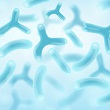
Research on probiotics has accelerated over the past decade. As a result, more species-specific clinical data are now available. And in 2020, the Lactobacillus genus was reclassified into 25 different genera. We recently developed a significant amount of new content to ensure that our monographs align with both these changes and the growing body of evidence. Lactobacillus and Bifidobacteria were split into 10 new species-specific monographs, to join our existing species-specific monographs for Bacillus coagulans, Saccharomyces boulardii, and Streptococcus thermophilus. We also developed 11 Fast Facts monographs, which provide quick information on species with emerging research. And we developed a monograph on Postbiotics, a new microbiome-based product class. Over the next few months, we’ll be reviewing some of the biggest changes in our newsletter.
Bifidobacteria are a good place to start. The genus Bifidobacterium is a group of lactic acid- and acetic acid-producing bacteria that naturally live in the colon. This topic is now split into 4 separate monographs – you’ll notice that evidence for certain conditions varies by species. For example, clinical research shows that taking B. bifidum might help reduce symptoms of irritable bowel syndrome (IBS). But B. breve has only been taken in combination products for this condition, so it’s not clear if taking it alone will help. Similarly, giving B. lactis to infants seems to help reduce colic symptoms – but there isn’t enough clinical data to know if B. longum will offer the same benefits. Next month, we’ll dive into the Lactobacillus genus.
The probiotics market is massive. It’s important to help patients understand that not all probiotics have the same effects on the body – we’re still learning about which species might benefit certain conditions, as well as whether combination products might be beneficial. Check out our new species-specific monographs to learn more. And keep your eyes peeled for our brand new CE course on Pre-, Pro-, and Postbiotics, set to be released later this summer.
The information in this brief report is intended for informational purposes only, and is meant to help users better understand health concerns. This information should not be interpreted as specific medical advice. Users should consult with a qualified healthcare provider for specific questions regarding therapies, diagnosis and/or health conditions, prior to making therapeutic decisions. Copyright © 2025 NatMed. Commercial distribution or reproduction prohibited. NatMed is the leading provider of high-quality, evidence-based, clinically-relevant information on natural medicine, dietary supplements, herbs, vitamins, minerals, functional foods, diets, complementary practices, CAM modalities, exercises and medical conditions. Monograph sections include interactions with herbs, drugs, foods and labs, contraindications, depletions, dosing, toxicology, adverse effects, pregnancy and lactation data, synonyms, safety and effectiveness.
